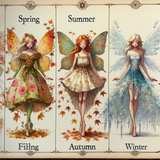The Greek World of Fairies
Stepping into the realm of Greek mythology is akin to entering a vivid dreamscape of epic tales, heroic deeds, and magical beings. Among these, the notion of "fairies" is quite unique when compared to the common perception fuelled by Celtic or Nordic legends. Greek fairies, often synonymous with nymphs and other ethereal entities, are intricately woven into the tapestry of Hellenic lore. These beings aren't just whimsical creatures with wings; they often represent the very elements of nature, embodying its beauty, wrath, and mystery.
Most Popular Greek Fairies
Nymphs Greek Fairy
The nymphs are perhaps the most well-known of the Greek fairies. These female spirits of nature, often associated with specific landmarks like mountains, trees, seas, and springs, can be found throughout Greek mythology. While their appearance often mirrors that of beautiful young maidens, they can occasionally transform into the natural element they protect.
Special Power: Nymphs possess the ability to heal, prophesize, and offer protection. Some, like the Naiads (water nymphs), have control over their respective water bodies and can manipulate it as they wish.
Fame: Nymphs like Echo, who was cursed to only repeat the last words spoken to her, or Daphne, who transformed into a laurel tree to escape Apollo's advances, have their tales etched into Greek mythological canons.
Dryads Greek Fairy
Specifically tree nymphs, dryads are spirits associated with the trees, primarily oaks. They’re considered the souls of the trees, and any harm coming to the tree directly affects the Dryad.
Special Power: Dryads can communicate with nature, drawing strength and vitality from their bonded tree.
Fame: In the tale of Erysichthon, his offense of cutting down a sacred tree led to a Dryad's curse which made him perpetually hungry, leading to his tragic end.
Moirai (Fates) Greek Fairy
The Moirai, often referred to as the 'Fates,' are three powerful deities who weave the destinies of mortals and gods alike. Clotho spins the thread of life, Lachesis measures it, and Atropos cuts the thread, determining the individual’s moment of death.
Special Power: The power to control fate and destiny.
Fame: They're known to even have the gods under their will, making Zeus himself wary of their decrees.
Harpies Greek Fairy
Harpies, often depicted with the body of a bird and the face of a woman, are spirits of wind. They are often associated with punishment, carrying evildoers away to face their consequences.
Special Power: Flight and the ability to torment those who have done wrong.
Fame: In the tale of King Phineus, the Harpies were sent to torment him by stealing his food, leaving him perpetually starving.
Erinyes (Furies) Greek Fairy
Representing the avenging forces of nature and order, the Furies, with snake-infested hair and bat wings, punish those guilty of crimes against the natural order, especially murderers.
Special Power: The Furies possess the ability to torment evildoers, driving them to madness.
Fame: In the tragedy "Oresteia" by Aeschylus, the Furies torment Orestes for the murder of his mother, Clytemnestra, until Athena intervenes.
Greek Fairy Myth Famous Stories:
Greek mythology is a treasure trove of tales where fairies, or entities akin to them, play pivotal roles.
In the tale of Orpheus and Eurydice, it's the Naiads who mourn the tragic fate of Eurydice after she steps on a venomous snake. Their lamentations echo the sorrow of Orpheus, the legendary musician.
Another tale recounts the love story of Hylas and the nymphs. Hylas, a companion of Hercules, was abducted by water nymphs, enchanted by his beauty. His disappearance led Hercules to embark on a futile quest, searching for his lost friend.
Then, there’s the haunting story of the Aloadae, twin giants who attempted to storm Mount Olympus. They kidnapped Ares, the god of war, and trapped him in a bronze jar. The allure of the beautiful nymph Thetis was used to distract and eventually defeat them.
In conclusion, the Greek fairies, distinct from their counterparts from other cultures, offer a mesmerizing blend of beauty, might, and mystery. They embody the elements, command the fates, and both enchant and terrify. Their tales, etched into ancient scriptures and epics, remain a testament to Greece's rich tapestry of myths and legends, resonating with the passions, fears, and desires that are universally human.







